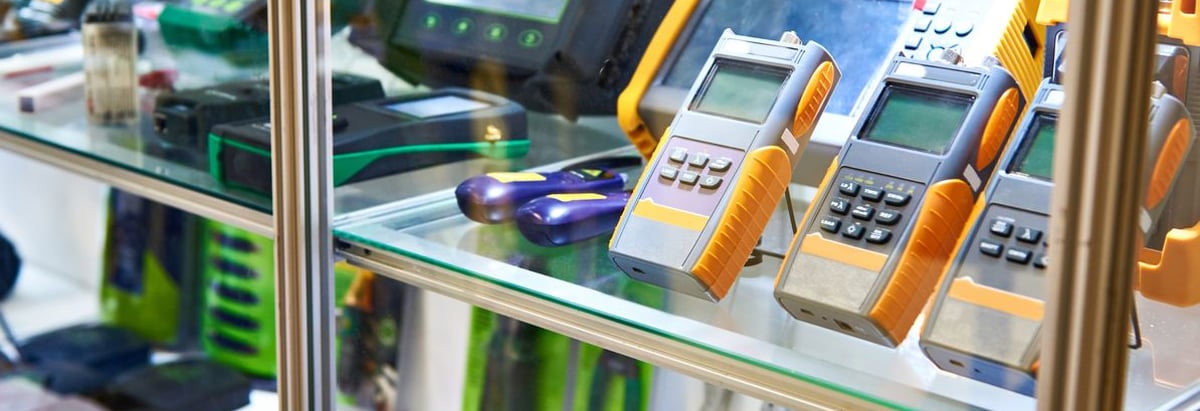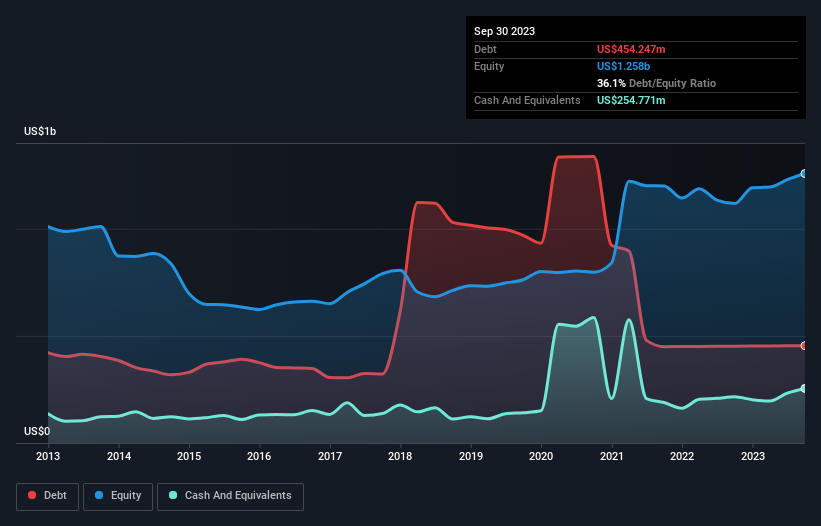- United States
- /
- Electronic Equipment and Components
- /
- NasdaqGS:ITRI
These 4 Measures Indicate That Itron (NASDAQ:ITRI) Is Using Debt Reasonably Well

Warren Buffett famously said, 'Volatility is far from synonymous with risk.' So it might be obvious that you need to consider debt, when you think about how risky any given stock is, because too much debt can sink a company. As with many other companies Itron, Inc. (NASDAQ:ITRI) makes use of debt. But is this debt a concern to shareholders?
When Is Debt A Problem?
Generally speaking, debt only becomes a real problem when a company can't easily pay it off, either by raising capital or with its own cash flow. In the worst case scenario, a company can go bankrupt if it cannot pay its creditors. However, a more common (but still painful) scenario is that it has to raise new equity capital at a low price, thus permanently diluting shareholders. By replacing dilution, though, debt can be an extremely good tool for businesses that need capital to invest in growth at high rates of return. The first step when considering a company's debt levels is to consider its cash and debt together.
Check out our latest analysis for Itron
What Is Itron's Debt?
As you can see below, Itron had US$454.2m of debt, at September 2023, which is about the same as the year before. You can click the chart for greater detail. However, because it has a cash reserve of US$254.8m, its net debt is less, at about US$199.5m.

How Healthy Is Itron's Balance Sheet?
According to the last reported balance sheet, Itron had liabilities of US$555.9m due within 12 months, and liabilities of US$697.8m due beyond 12 months. On the other hand, it had cash of US$254.8m and US$318.1m worth of receivables due within a year. So its liabilities outweigh the sum of its cash and (near-term) receivables by US$680.8m.
This deficit isn't so bad because Itron is worth US$2.96b, and thus could probably raise enough capital to shore up its balance sheet, if the need arose. But we definitely want to keep our eyes open to indications that its debt is bringing too much risk.
We measure a company's debt load relative to its earnings power by looking at its net debt divided by its earnings before interest, tax, depreciation, and amortization (EBITDA) and by calculating how easily its earnings before interest and tax (EBIT) cover its interest expense (interest cover). Thus we consider debt relative to earnings both with and without depreciation and amortization expenses.
Itron has a low net debt to EBITDA ratio of only 1.1. And its EBIT covers its interest expense a whopping 120 times over. So you could argue it is no more threatened by its debt than an elephant is by a mouse. Although Itron made a loss at the EBIT level, last year, it was also good to see that it generated US$124m in EBIT over the last twelve months. When analysing debt levels, the balance sheet is the obvious place to start. But ultimately the future profitability of the business will decide if Itron can strengthen its balance sheet over time. So if you want to see what the professionals think, you might find this free report on analyst profit forecasts to be interesting.
Finally, a business needs free cash flow to pay off debt; accounting profits just don't cut it. So it's worth checking how much of the earnings before interest and tax (EBIT) is backed by free cash flow. In the last year, Itron's free cash flow amounted to 33% of its EBIT, less than we'd expect. That weak cash conversion makes it more difficult to handle indebtedness.
Our View
On our analysis Itron's interest cover should signal that it won't have too much trouble with its debt. However, our other observations weren't so heartening. For instance it seems like it has to struggle a bit to convert EBIT to free cash flow. Considering this range of data points, we think Itron is in a good position to manage its debt levels. Having said that, the load is sufficiently heavy that we would recommend any shareholders keep a close eye on it. There's no doubt that we learn most about debt from the balance sheet. However, not all investment risk resides within the balance sheet - far from it. Be aware that Itron is showing 1 warning sign in our investment analysis , you should know about...
If, after all that, you're more interested in a fast growing company with a rock-solid balance sheet, then check out our list of net cash growth stocks without delay.
New: AI Stock Screener & Alerts
Our new AI Stock Screener scans the market every day to uncover opportunities.
• Dividend Powerhouses (3%+ Yield)
• Undervalued Small Caps with Insider Buying
• High growth Tech and AI Companies
Or build your own from over 50 metrics.
Have feedback on this article? Concerned about the content? Get in touch with us directly. Alternatively, email editorial-team (at) simplywallst.com.
This article by Simply Wall St is general in nature. We provide commentary based on historical data and analyst forecasts only using an unbiased methodology and our articles are not intended to be financial advice. It does not constitute a recommendation to buy or sell any stock, and does not take account of your objectives, or your financial situation. We aim to bring you long-term focused analysis driven by fundamental data. Note that our analysis may not factor in the latest price-sensitive company announcements or qualitative material. Simply Wall St has no position in any stocks mentioned.
About NasdaqGS:ITRI
Itron
A technology, solutions, and service company, provides end-to-end solutions that help manage energy, water, and smart city operations worldwide.
Undervalued with solid track record.
Similar Companies
Market Insights
Community Narratives



